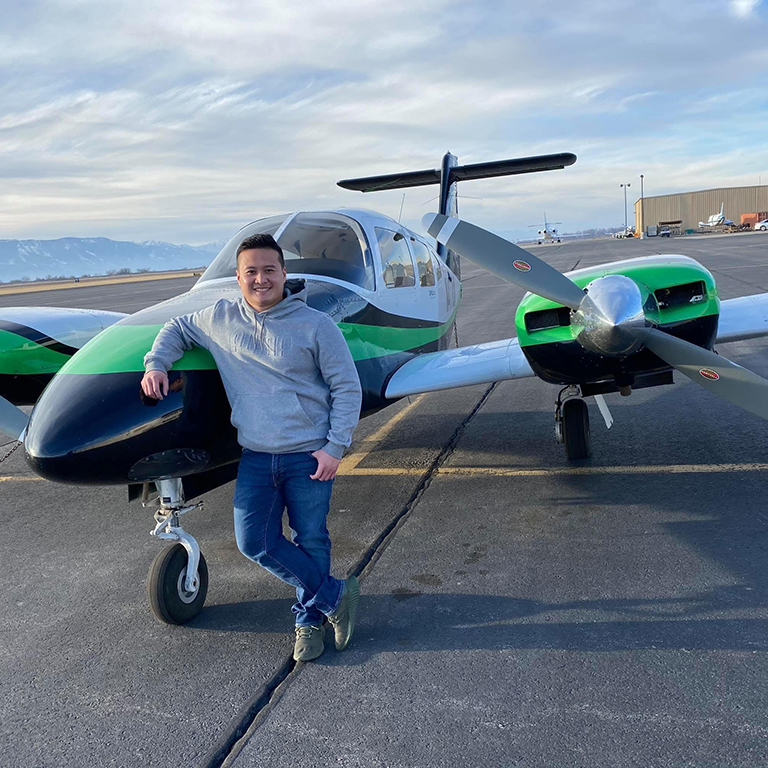By Juliet Fang
NORTHWEST ASIAN WEEKLY

Daniel Tran in front of a PA-44.
“In the military, there’s a saying that, for every pilot, there always was a child with a dream. That really rings true for me. When I moved to the United States from Vietnam at the age of 14, I knew that I wanted to be in aviation,” says Daniel Tran, a Seattle native and recent graduate from Officer Candidate School (OCS) of the United States Navy in Newport, Rhode Island.
“At my American public school, there certainly was a culture of going on a traditional path towards college, but I wanted something different,” he said.
“Even growing up in an Asian family, where there’s a lot of pressure to lean toward a certain career, I built my life around becoming a pilot.

Daniel Tran with his wife, Tiffany Chau Tran.
“So I applied to lots of military schools in my senior year of high school. My family was very supportive of this decision, too, which may not be reflective of most Asian families. My parents, and now, my wife—they’ve been integral to where I am today. I could not have achieved what I have without their support.”
OCS is a military school that trains civilians and enlisted soldiers to be efficient officers in military-oriented fields of engineering, finance, mechanics, and communications. The 13-week program includes advanced classroom instruction and on-the-ground training. Graduates of the school are commissioned as an Ensign and join the ranks of military leadership.
“OCS was definitely the most challenging thing I’ve ever done in my life,” Tran reflected. “It’s not just physically challenging, but extremely mentally challenging. You had to be very prepared to come here.
“You have to have a very high level of attention to detail and be able to pick up a subject in a short amount of time and execute tasks quickly. It’s very real-life, that sort of way.”
Indeed, graduating OCS is no simple task. Besides constant (and grueling) physical training, students must take classes on naval history, seamanship, navigation, and military law. Students at the school must also abide by the strict honor code, and deviation from this honor code results in swift expulsion. Yet, despite these obstacles, Tran found that the greatest challenge was going back to college to receive a bachelor’s degree.
“I enlisted directly out of high school, joining Electronic Attack Squadron 142 stationed at Whidbey Island. I spent a long time there. When I got out in 2018, I decided to pursue a Bachelor’s of Aviation Science at Utah Valley University.
“By that time, I’d been out of the school environment for seven years,” he said. “I wasn’t used to school anymore, and I had moments of self-doubt where I questioned if getting a bachelor’s was really for me. Regardless, I kept my intentions straight and reiterated to myself that school is the number one most important thing. I had to achieve my ultimate goal of being a pilot, and I needed a Bachelor’s to get me there.”
Though school proved to be a major hurdle on Tran’s path towards becoming a naval aviator, he cites elements of his cultural background growing up in an Asian household as critical for his eventual success.
“Everyone knows how disciplined Asian parents can be. I was raised with that discipline and it instilled in me the need to always keep my goals close to my heart. And, of course, my parents regarded education as really paramount. I think growing up in an environment where education was greatly valued helped me get through those tougher times in school.”
Soon, Tran will relocate to Pensacola Naval Air Station in Florida to participate in the Naval Introductory Flight Evaluation. There, he will officially begin his dream of becoming a Naval Aviator.
“At the end of the day, what I’ve really learned in life is that it’s completely fine to deviate from traditional routes as long as you don’t deviate from your ultimate goal,” he said. “My ultimate goal was to be a pilot. I didn’t get here the way you traditionally would, but I persevered and here I am.
Juliet can be reached at info@nwasianweekly.com.



